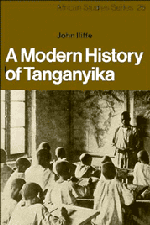Book contents
- Frontmatter
- Contents
- List of maps and tables
- Preface
- Acknowledgments
- Terminology
- Abbreviations
- Map I Tanganyika
- 1 Intentions
- 2 Tanganyika in 1800
- 3 The nineteenth century
- 4 The German conquest
- 5 Colonial economy and ecological crisis, 1890–1914
- 6 The Maji Maji rebellion, 1905–7
- 7 Religious and cultural change before 1914
- 8 Fortunes of war
- 9 The origins of rural capitalism
- 10 The creation of tribes
- 11 The crisis of colonial society, 1929–45
- 12 Townsmen and workers
- 13 The African Association, 1929–48
- 14 The new colonialism
- 15 The new politics, 1945–55
- 16 The nationalist victory, 1955–61
- Bibliography
- Index
15 - The new politics, 1945–55
Published online by Cambridge University Press: 03 May 2011
- Frontmatter
- Contents
- List of maps and tables
- Preface
- Acknowledgments
- Terminology
- Abbreviations
- Map I Tanganyika
- 1 Intentions
- 2 Tanganyika in 1800
- 3 The nineteenth century
- 4 The German conquest
- 5 Colonial economy and ecological crisis, 1890–1914
- 6 The Maji Maji rebellion, 1905–7
- 7 Religious and cultural change before 1914
- 8 Fortunes of war
- 9 The origins of rural capitalism
- 10 The creation of tribes
- 11 The crisis of colonial society, 1929–45
- 12 Townsmen and workers
- 13 The African Association, 1929–48
- 14 The new colonialism
- 15 The new politics, 1945–55
- 16 The nationalist victory, 1955–61
- Bibliography
- Index
Summary
During 1954 and 1955 a nationalist movement was created in Tanganyika: the Tanganyika African National Union. It sought to usurp central control of the territory by means of popular support and the threat of disorder, with the object of making Tanganyika a nation state similar to those which dominated the twentieth-century world order. This combination of characteristics distinguished TANU from all previous political movements in Tanganyika.
One purpose of this chapter is to explain TANU's emergence. The most penetrating analysis of colonial nationalism refers to India and argues, broadly, that Indian politics took a nationalist form because the expansion of the colonial state and its representative institutions obliged Indians to combine into a territorial organisation in order to advance their interests. Indian nationalism was ‘a matching structure of polities’ within the framework of British rule. This analysis is based on documentation superior to that available in Tanganyika, where only a few TANU records and private papers are yet accessible, and it probably has much relevance to Tanganyika. As TANU's leader reflected:
Until we were colonised, this ‘nation’ did not exist, different laws operated among the constituent tribes and there was conflict between them. It was the colonial power which imposed a common law and maintained it by force, until the growth of the independence movement put the flesh of an emotional unity on to the skeleton of legal unity.
- Type
- Chapter
- Information
- A Modern History of Tanganyika , pp. 485 - 520Publisher: Cambridge University PressPrint publication year: 1979



